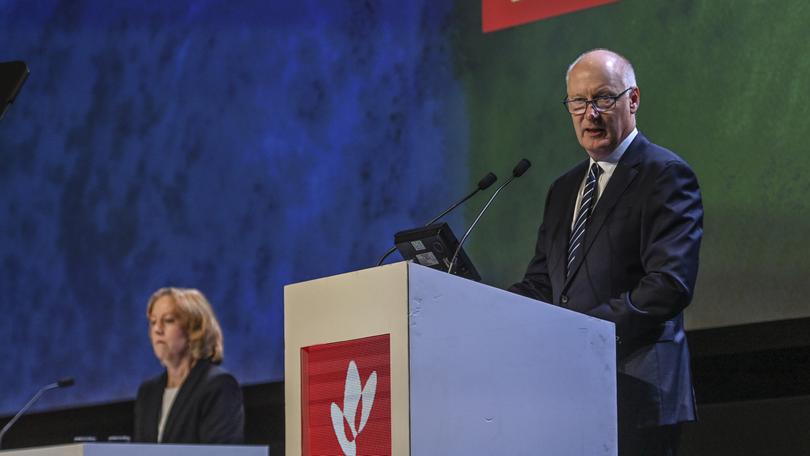An investor backlash on climate leaves Woodside Energy in a pickle
Investors seem to want the best of both worlds from Woodside on climate change. That might leave the business struggling to deliver either.

The prize for the most astute insight into the uprising against Woodside Energy and its chair Richard Goyder surely goes to MST Marquee’s Saul Kavonic.
“The truth is some investors want to own oil and gas companies while also not wanting to own oil and gas companies,” he said.
Those investors have enjoyed dividends totalling about $5 per share in the past three years and yet many are agitating for a shake up of the business’s strategy.
Sign up to The Nightly's newsletters.
Get the first look at the digital newspaper, curated daily stories and breaking headlines delivered to your inbox.
By continuing you agree to our Terms and Privacy Policy.Mr Goyder seems set to stay at the helm when the ballots are counted following the Perth-based business’s annual meeting on Wednesday.
But the climate strategy — non-binding although somewhat crucial for the country’s seventh-largest carbon emitter — is expected to be hit by another big backlash and could even be voted down.
The ASX20 company will be left battling to walk both sides of the street on emissions and shareholder returns.
There’s still demand for natural gas, and the International Energy Agency expects use will lift 2.5 per cent this year.
The IEA says the fuel will stay in the global energy mix even if the world hits net zero by 2050, albeit with reduced demand and requiring carbon capture.
Woodside wants to stay in that market.
The company and partners could devote roughly $40 billion into oil and gas projects in the next decade, with Scarborough to be followed by Browse and even Sunrise in the Timor Sea. That’s just in Australia.
Scarborough was already environmentalist enemy number one and Woodside will feel the heat more with each project — from investors, governments, regulators, protesters, and court challengers.
Politicians give the industry support but it’s not difficult to see that washing away if the tide changes.
A dramatic shift in the world’s trajectory on carbon means a chance the capital will not be fully recouped. Just ask Shell what it’s like to know you’ll never make your investment back on a project like Prelude.
Vocal shareholders have zeroed in on this risk.
Woodside’s second option is to go big on green, which has so far been fraught.
Green hydrogen is yet to see commercial success and as chief executive Meg O’Neill pointed out last week, the business is still working to find a buyer who wants to pay for the offtake.
The company’s H2Perth plant missed out on Federal Government backing through Hydrogen Headstart, a blow to the commercial potential for a project which was intended to be in construction this year.
There are hopes hydrogen will replace natural gas for industrial use, but production is still much more expensive.
Hydrogen will be highly competitive, too, because Australia’s natural gas customers will be able to produce the new green fuel themselves anywhere they have water and power.
Woodside’s third, more radical, option would be to pivot entirely and have a crack at running wind and solar farms. That’s a sector where the company is short on experience and long on competitors.
Those barriers give an idea why Woodside has largely stuck to what it knows and is yet to spend much of the $US5 bn ($7.6bn) it promised for low carbon energy.
Woodside is not the first petroleum business to be tied in knots about preserving shareholder value as the world decarbonises.
Shell faced an internal revolt last year amid reports the supermajor would slow its carbon cutting plans.
The simple conclusion is that making the green transition happen is not as easy as putting out press releases about it.
Why then are investors lining up to knock back the plan and in some cases, to swing the axe on Mr Goyder?
Governments have struggled to do much about fossil fuel demand, so climate-conscious investors have decided to do something about supply.
Britain’s Legal & General Investment Management is one such investor and has a stated strategy of picking companies in the hopes of pushing for more climate action.
The trillion-dollar fund wants Woodside to lock in a net zero by 2050 target — rather than an “ambition” — and to be clearer on scope 3 emissions from its customers.
Ms O’Neill reckons investors want the company to “say more” on climate, rather than being credible.
As for the chairman, Mr Goyder was already wounded after severe turbulence at Qantas late last year, and a large protest vote on Wednesday would inflict another deep cut.
Perhaps the intended message is not just for him, however — directors and executives across the industry will be left wondering who is next.
